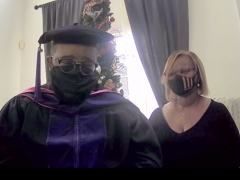Elon Law’s Donning of the Kente ceremony on the eve of Commencement for the Class of 2020 was the first to be hosted in a virtual format as graduates active in the Black Law Students Association and their families celebrated the significance of their achievement.
It can be a tough reality: sometimes, you fail in life. That doesn’t mean you can’t grow from the experience.
Attorney Margaret Dudley’s advice? Keep working hard and know that past disappointments shouldn’t stop you from striving to help others.
“Your law degree will empower you to work for social justice at a new level,” Dudley told more than a dozen of Elon Law’s newest graduates the day before Commencement for the Class of 2020. “Your work, believe it or not, is just beginning. It’s just going to be in a different place. You will still have to study. Hard work works. You will still face obstacles and disappointments. You will fail sometimes, so learn the lesson of that failure.”
Dudley, the supervising attorney for Elon Law’s Emergency Legal Services Program, which assists the Family Justice Centers of Guilford and Alamance counties, delivered keynote remarks on December 11, 2020, at an annual Donning of the Kente Ceremony that celebrates students active in the Black Law Students Association.

Dudley was introduced by Associate Dean Wendy Scott. Her remarks quickly turned to all that has roiled the United States in 2020, from the deaths of several Black citizens at the hands of police to attacks on the validity of the nation’s electoral systems to a global pandemic.
Yet one of the good things about 2020 was how graduates taking part in the ceremony have earned their Juris Doctor, she said. Dudley then noted several distinguished Black lawyers and jurists whose contributions to the profession and to society should inspire all attorneys.
- The Hon. Thurgood Marshall, the first African-American nominated and confirmed to the Supreme Court of the United States
- The Hon. Henry Frye, the first African-American chief justice of the North Carolina Supreme Court
- The Hon. Cheri Beasley, the first African-American female chief justice of the North Carolina Supreme Court
- The Hon. Teresa Vincent, the first African-American district court judge of 18th Judicial District where Elon Law is located
- Avery Crump, the first African-American to hold both the position of a district court judge and district attorney in Guilford County
- The Hon. Elreta Melton Alexander-Ralston, the first Black female judge in North Carolina and first African-American woman to graduate from Columbia Law after attending high school in Greensboro
- The late Dean Emeritus and Professor George Johnson, a founding faculty member at Elon Law

Graduates should remember that their success was not achieved in a vacuum.
“Someone saw something in you that they considered worth the sacrifice and hard work, so they supported you,” Dudley said. “They encouraged you and challenged you. Always remember your need to do that for others.”
Graduates who took part in the ceremony received in advance a stole made of kente cloth imported from West Africa. Each graduate selected a mentor or family member to present their kente cloth, acknowledging the work and perseverance of completing law school while encouraging their future endeavors. Each was then featured live on camera during the virtual presentation, which was organized and hosted by Assistant Professor Tiffany Atkins L’11.
The kente cloth symbolizes and celebrates prestige in many African societies. Its origins date to 12th Century Ghana where the cloth was worn by kings, queens and important figures of state in Ghanaian society, during ceremonial events and special occasions. In a cultural context, it is a visual representation of African history, philosophy, ethics, oral literature, moral values, social code of conduct, religious beliefs, political thought and aesthetic principles.
Graduates wear the stole, embroidered with the BLSA acronym and their class year, at Commencement.
“The donning of the kente serves as a cultural ceremony celebrating the achievements of Elon Law students who recognize their African roots,” Elon Law Dean Luke Bierman said in his welcoming remarks. “We trust the donning will be a positive and memorable experience that rewards our graduates and their loved ones with a personal and culturally relevant ceremony at this significant moment in their family histories and in the history of our nation as we advance the cause of racial justice and equal justice under law for all people.”

Bierman also led the online gathering of more than 100 viewers in a moment of silence and reflection in memory of Johnson, who died November 15, 2020, following a lengthy illness. Johnson had served as a mentor to many Elon Law students since the school opened in 2006, notably with contributions to the Black Law Students Association.
“His passing leaves a deep hole in the heart and soul of our law school community,” Bierman said. “Just last year he stood before graduates at this very ceremony to accept a stole just like the ones that adorn you. We mourn his loss. But we celebrate his legacy. And I trust you know – and indeed feel – the pride he expressed in each and every one of you.”



